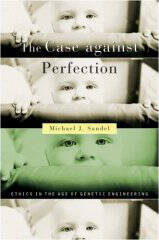Dear Kristi,
It is a pleasure to engage in this dialogue with you about Michael Sandels The Case Against Perfection. I think youll agree that he has done a superb job making complex arguments accessible to a general readership. In fact, the book is written so compactly that I worry readers might miss the subtleties. One could read it in a couple of hours, but that would be a mistake. One should digest it slowly.
One of the most striking aspects of the book is its quasi-theological character. Sandel seems to understand that questions of biological enhancement, cloning and the use of stem cells are important not only for their socio-economic implications, but because they raise fundamental questions about what it means to be human. Contemporary Anglo-American philosophy has traditionally looked upon such questions as either meaningless or interesting language games. Or, alternatively, as the sorts of questions one cannot help but engage, but ought to do so with the knowing wink of irony. Sandel realizes that these questions cannot be addressed adequately with arguments about competing interests.
Yet, as a philosophical writer addressing a largely post-religious culture, he seems to feel the need to apologize for discussions that verge on theology or evoke a religious sensibility. What he has discovered is that when the most serious moral questions press upon us, we rediscover the fact that every ethos implies a mythos--that is, that every system of moral thinking must, at least implicitly, be founded upon some story about the nature of being human. He acknowledges that before we deal with serious ethical questions, we need to understand something about our proper stance towards the given world. In the words of William May, we need to have a sense of openness to the unbidden, to understand that our coming into being is a given, not something that we can control. Christian faith has answers for these questions. Sandel struggles to find non-religious answers to questions he thinks are fundamentally religious.
I look forward to your response.
Best wishes,
Dan Sulmasy, OFM
Dear Dan,
Your articulate thoughts about Sandels book have given me a lot to ponder. Your comment that every ethos implies a mythos reminded me of Jungs notion of the collective unconscious. Powerful archetypes and myths really do resonate with each generation. Whether we are talking about Prometheus, Adam and Eve, or the Bionic Man, the struggle to balance knowledge and domination with acceptance and wonder endures.
I agree that Sandels book has a quasi-theological character, but I wonder whether his struggle to find non-religious answers to fundamentally religious questions is a pre-emptive strike of sorts. Having served on the Presidents Council on Bioethics from 2001-2004, he is probably primed to anticipate the arguments of those who would dismiss the book if they sensed it was religiously grounded. He is also careful, I think, not to reveal the foundation of his own personal beliefs about the giftedness of life. Does he subscribe to a religious or secular explanation? I cant tell from his book. What I can tell is that he has a profound respect for life as mystery, beyond an individuals ability to comprehend or control. He is also mindful of the social consequences of an unbridled desire and quest for perfection.
For me, Sandel is at his most compelling when he explores these social consequences--particularly in his discussion of humility, responsibility and solidarity. Humility acknowledges not only that we are not solely responsible for our lives, but that our limits of knowledge are finite. Isnt medicine a quintessential example of this? Ive been a practicing physician now for about 20 years--long enough to see dogma relegated to the dustbin on far too many issues (hormone replacement therapy, Swan Ganz catheters and COX-2 inhibitors to name just a few). In an arena closer to the subject of Sandels book--disability prevention--I was struck by the recent data suggesting that a fairly benign public health intervention to prevent neural tube defects might have significant unforeseen medical consequences. Given our often myopic vision and limited tools of discernment, humility in the face of genetic engineering seems incontrovertible to me.
Regards,
Kristi L. Kirschner, M.D.
Read part 2 of this discussion.








